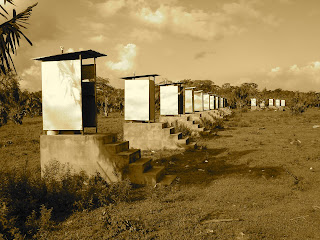The cable that brings internet to Central America was broken for 2 days last week at the fault of fishermen. Or at least that's what they're telling us. Doesn't sound like a likely story to me, but it is true that most countries in this part of the world were without internet for almost 2 days. I tried to find an article about it, but the only one I found was just about columbia. (although this same article has the little nugget about the culpable fisherman, which was news to me)
But I wasn't too affected as I spent most of last week in the eastern side of Nicaragua. It was quite an experience. A little background: the two regions in the Caribbean side are called RAAN and RAAS, and they are autonmous regions consisting mostly of indigeous villages. In the early 90's these regiones gained autonomy, which in principle it gives them control over their own resources, including land.
The UN publishes a Human Development Index, which ranks the level of "development" within 177 countries. If RAAN and RAAS were officially their own country, they would rank at number 171 out of 177. (While all of Nicaragua ranks at 113.)
It was like nothing I'd ever seen. It's sort of like everyone is permanently camping. They have houses, which they've made from wood cut from the abundent forest. They eat fruit, grain, vegatables grown from their land and the meat from the animals, which are also quite plentiful. But they have no roads so trade between villages is very low, and most people don't particpate in anything close to a formal economy, nor have access to any social services. The education system is virtually non-existent other than donor sponsored schools, most people have no access to medical services or access to clean water.
So, they have the potential to have great lives because the land they live on is so furtile, and thanks to the laws of autonomy in this region, most people actual own the rights to their land. Unfortunately, thanks to a few select companies who extract wood and minerals, the river is polluted and clean water is hard to come by. Lack of education about keeping animal carcasses and both human and animal waste out of river is also a large 'natural' source of pollution, so we can't blame everything on big business here. The main kicker is that lack of roads means that all transporation between communities is by river or horse or foot...combine this remoteness with unsanitory conditions and the potential paradise quickly fades away to a standard of living far below anything a human should have to bare. But at least they're not starving.
I was there with a team of consultants who were deciding which villages to sponsor over a 5 year period. The project would involve education on sanitation, as well as training on, and the provision of, appropriate clean water technology. I accompanied them on their first day...which included 6 hours in a wooden oversized canoe with a motor. And we didnt' even reach the furthest communities which would take a good 12 hours round trip. Keep in mind that this is the distance with a motor - which makes the 'main' town and the health clinic virtually imposible to reach for most.
The purpose of the community visits were to interview households on their current water and sanitation habits and view the existing technology they had. In most cases 'technology' was nothing more than a bucket to catch rain water, or perhaps a filter or a well at the very highest level. However, the only community I saw that had a well, didn't even use it because it had a broken cable, and they didnt' know where in the world to get a cable to fix it. We were also there to gauge the level of interest the village had in recieving outside help. Despite the even need, some communities are eager to 'develop' while others are not, which has a lot to do with the indigenous culture of living directly off the land. As opposed to some government sponsored projects which have left many wellbuilt wells and latrines unused, UNICEF trys to make sure that the technology will actually be used and that the people are eager to try something new.
I read a statistic saying that 9% of the people had access to water, and as the house we stayed in didn't even have running water, i though that at least those 9% must be fairly well off. After a little investigation I learned that it was 9% that had
access to clean water.
After a 3 hour return trip consisting of 3 downpours and 3 periods of powerful sun in the very open air canoeish boat, I was a bit beat. But loved every second of it. The next day wasn't as eventful, but it was interesting all the same. Visitng an area further north, I interviewed health administrators about their policies regarding HIV/AIDS and began gathering data for my report. I have a lot of work to do, but it's going to be a great experience.
I'm back in Managua now where the weather has cooled thanks to the rains that continue to wash away entire houses. The women who works in my house is making fresh orange juice and doing my laundry as we speak, while the young man who works in my friends house is taking a few days off because his 18 year old brother just drowned trying to help two children who fell into an open drainage system in the most recent downpour.













